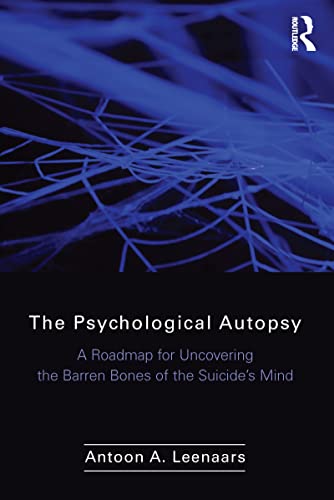The Psychological Autopsy
Antoon Leenaars
BOOK REVIEW

In the poignant realm of psychology, The Psychological Autopsy weaves a tapestry of human despair, revealing the shadows that loom over the minds of those we have tragically lost to suicide. Authored by Antoon Leenaars, this groundbreaking work dives into the intricacies of understanding why individuals end their lives, transforming not just the study of psychology but also our very understanding of grief and loss.
At the heart of this profound investigation lies the psychological autopsy, a meticulous method that seeks to reconstruct the mental state of individuals prior to their deaths. Each chapter serves as a chilling reminder that beneath the surface of everyday life, there exists a silent struggle that often goes unnoticed. Leenaars, through this work, presents an uncompromising view-a grim yet essential discourse on the unseen battles individuals wage against their own minds. The narrative pulls you into a vortex of emotion, compelling you to confront uncomfortable truths about mental illness, societal neglect, and our collective denial of vulnerability.
Leenaars is not just a researcher; he embodies the emotional weight behind this subject. His exploration is steeped in compassion, yet it is starkly clear and methodical, ushering readers through the labyrinth of thoughts that may lead one to consider such a final decision. Critics have hailed this work as a crucial contribution to suicide prevention, causing ripples in both academic circles and advocacy groups alike. The volume's clinical approach, mixed with heartfelt case studies, evokes a sense of urgency to address mental health issues head-on.
Readers' opinions range widely, with many praising the author for his bravery in tackling such a sensitive topic. The bootstrapping of factual evidence with personal narratives reverberates deeply, sparking discussions often hushed in our society. Yet, some argue that the clinical detachment can come across as too cold, lacking the warmth needed to comfort those grappling with loss. This dichotomy is layered and significant, mirroring the very tension that exists in conversations about mental health-between understanding the data and feeling the emotions.
The psychological landscape has shifted dramatically since the book's publication. As awareness grows, so does the importance of works like Leenaars'. This text becomes a clarion call for those who might have thought the fight against stigma and misinformation was lost. The echoes of these pages urge you to look within yourself and extend your hand to others-because acknowledging the struggle is the first step to healing.
There's a compelling urgency in The Psychological Autopsy that nobody can afford to ignore. It teaches us that the narratives we construct about life and death shape our understanding of humanity itself. This book is not merely for scholars or practitioners; it's for anyone willing to comprehend the depths of despair that can sabotage human existence.
The emotional toll of the subject matter is unrelenting, yet this very vulnerability lays the foundation for a crucial conversation. To not engage with these narratives is to turn a blind eye to the fellow souls walking amongst us who suffer in silence. The Psychological Autopsy doesn't just portray loss; it beckons you to act, to understand, and to foster an environment where mental health discussions can flourish-breaking the chains of stigma that have long restrained them.
Ultimately, this book will haunt you in the best way. It stirs empathy, ignites action, and reminds you that the quest for understanding is far from over. The psychological autopsy may uncover the circumstances leading to tragedy, but it is our collective responsibility to ensure that these lessons pave the way for awareness, compassion, and, most importantly, hope. 🌌
📖 The Psychological Autopsy
✍ by Antoon Leenaars
🧾 378 pages
2017
#psychological #autopsy #antoon #leenaars #AntoonLeenaars